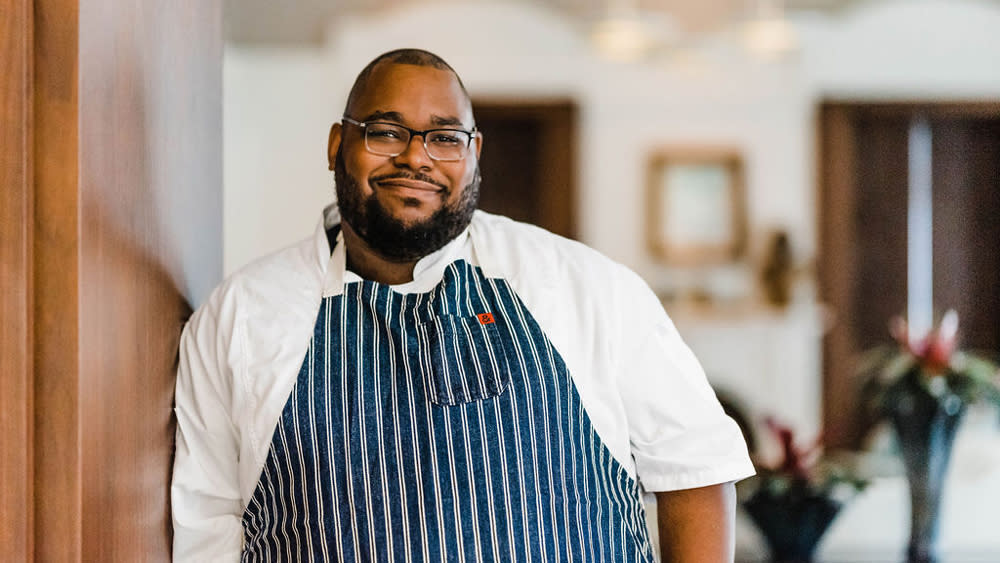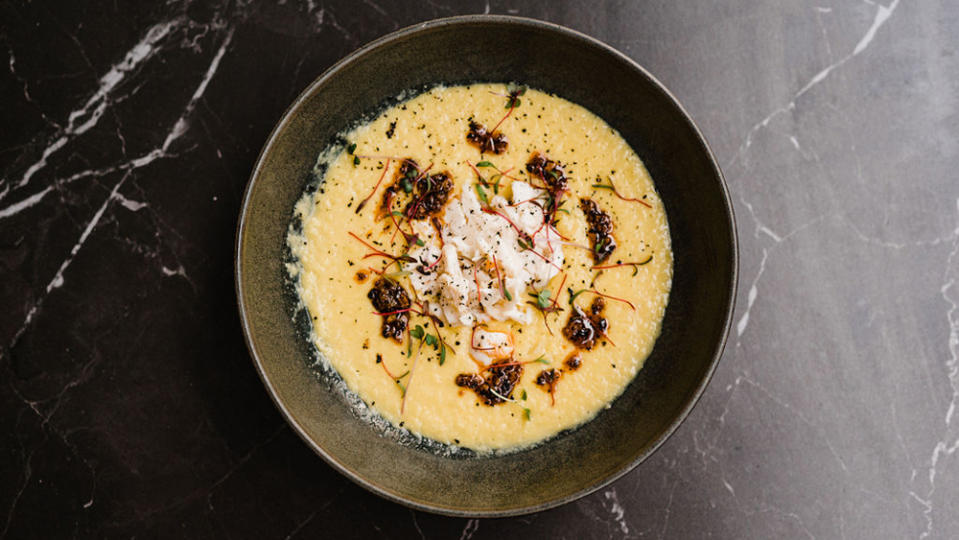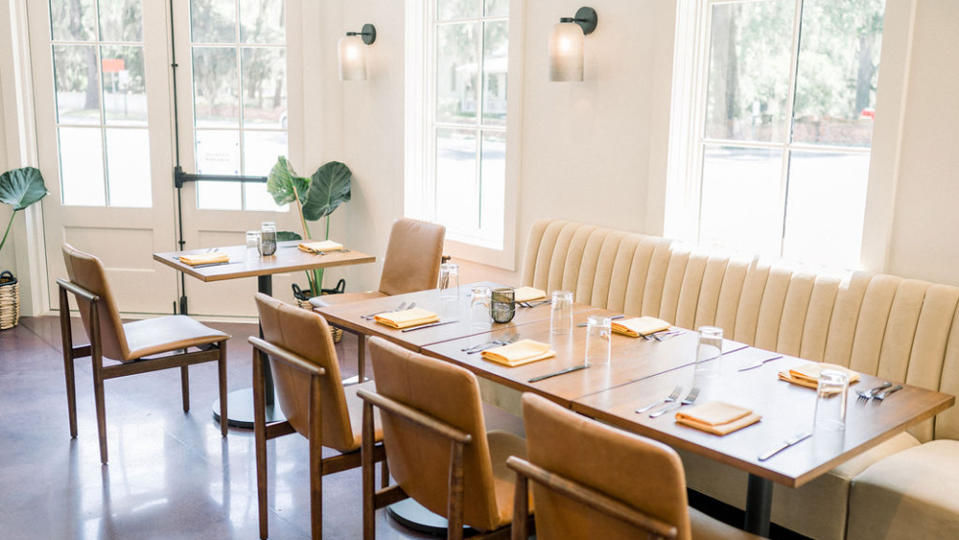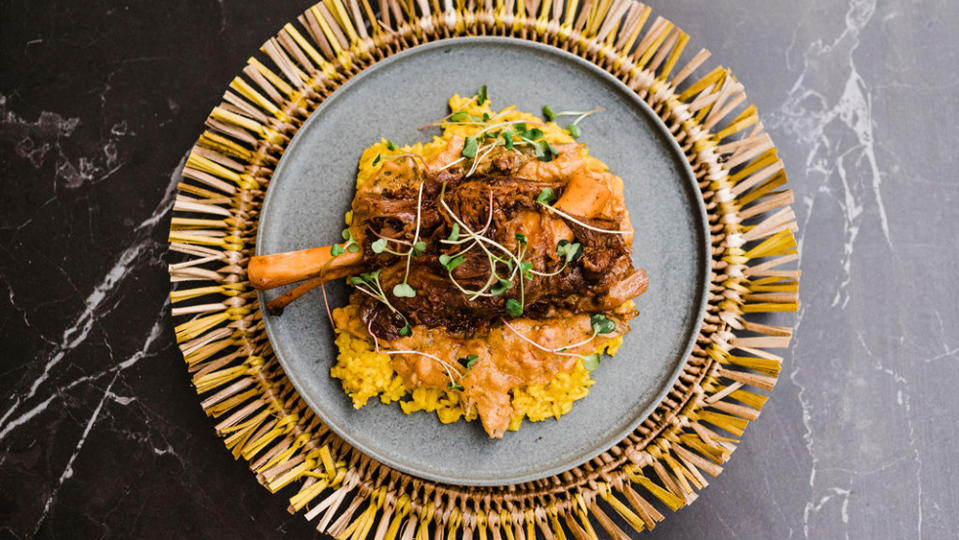This Chef Wants to Create a Destination for African-Inspired Cuisine in This Small South Carolina Town

Bernard Bennett brings out a bowl of warm, wobbly corn pudding and sets it on the table. Unlike most versions of the Southern staple, typically thickened with cream and eggs, his contains just corn, blended and cooked down until the corn’s natural starches begin to gel—or as Bennett says, “It’s really just the essence of the corn. It puddings itself.”
We’re sitting on a back porch overlooking the May River in Bluffton, South Carolina. Mosquitos, bless the bloodsuckers, haven’t started biting. The setting sun burns fiery orange, and a dolphin surges out of the brackish water as it corrals its dinner.
More from Robb Report
9 Spectacular Homes That Let You Enjoy Life Right on the Water
Golf Real Estate Is Booming. Here's How You Can Still Buy In to the Coveted Kiawah Island.
You can’t make this shit up. The meal, a preview of Bennett’s upcoming restaurant Okàn, feels like the set of a Southern Living photo shoot. And the chef has prepared a feast: whole fried snapper with pickliz, curried goat, pork belly in the style of Haitian griot, fried yucca with garlic-y mojo sauce, collards braised in coconut milk and vinegar, Charleston gold rice with Sea Island red peas, and that corn pudding topped with marinated wild oysters. More food comes. There’s little room for our wine glasses or the cups that hold the last sips of a compellingly wonky lima bean cocktail.

Earlier that afternoon, Bennett and I stopped by the Bluffton Oyster Company, just a few blocks east. He had planned to buy a few dozen oysters for the dinner but settled on a shucked pint-full instead. If Bennett wanted local cluster oysters in their shells, the saleswoman told him, he’d have to buy at least a half bushel and presumably hose off the pluff mud.
There’s a feeling in this small South Carolina town that this is the way things are done. The May River rises and drops seven to nine feet each day with the tides. Multi-generational oystermen scrape oysters from established beds. A mound of shells, bleached by the sun, grows from the parking lot. But change has come to Bluffton, and even the Bluffton Oyster Company, where there’s a map of the United States so thoroughly pinned with visitors’ hometowns that the whole of the East Coast hides beneath a blanket of primary-colored dots.
For much of its history, outsiders have ignored sleepy Bluffton, passing through on their way to Savannah, Hilton Head, or luxury resort Palmetto Bluff. But in the last few decades, the city’s population has grown 120 percent. Pine forests have been raised for housing tracts and golf courses, and a fledgling market for high-caliber dining has emerged where there was none.
Last week, Bennett opened his 122-seat Okàn in downtown Bluffton on a street named for the pro-slavery vice president and ardent secessionist John C. Calhoun. One of the chef’s business partners, developer Matt Cunningham, considered putting up a placard explaining Calhoun’s sordid past, but for now, Bennett’s African-meets-Caribbean-Lowcountry cooking will serve as its own rebuke.
Okàn started as a food truck in 2021. Emboldened by restaurant industry upheaval and the Black Lives Matter movement, Bennett leaned for the first time into his personal history and the cuisine of the African diaspora. He and his crew serve jollof rice, Trinidadian doubles, jerk chicken, and Jamaican-style curried snapper—and notably no soul food throwbacks, including fried chicken. “I’ve just always been a person who wants to find against stereotypes,” says Bennett.

Okàn, the restaurant, is set within The Bridge, a new mixed-use development, and it has a big-city build-out, complete with buttery banquettes, not-so-subtle eggplant-hued concrete floors, a 16-seat dining bar, and a wood-fired hearth.
Bennett is quick to clarify Okàn is not an African restaurant. He will explore Chinese and Indian influence in the Caribbean, sub out collards for dasheen (a.k.a. taro) leaves, dye Charleston gold rice yellow with turmeric, and season his fufu in a manner that would raise eyebrows in Ghana. “We’re a restaurant that serves African cuisine, and there are variables in that narrative,” he says. “I’m not an in-the-box person.”
Bennett didn’t grow up anywhere near Bluffton. He’s a dot on that map. Born in Chicago and raised in southern-central Michigan, Bennett lived for years with a grandmother who tended an impressive, family-feeding vegetable garden. After college, he returned to Chicago for culinary school and worked with his head down, first as a private chef and then in professional kitchens, including Southern Big Jones, downtown juggernaut River Roast, industry-favorite Three Aces, and music venue The Promontory. He planned to start as executive chef of The Gage, what he considered a dream job, on March 17, 2020. Insead, the world shut down.
Suddenly unemployed, Bennett brought his young family to Bluffton to escape the confines of their apartment, and though he briefly returned to the Midwest for restaurant work, he ultimately reversed his family’s northward migration and relocated to Lowcountry South Carolina.
Once home to rice plantations and then communities of emancipated slaves, this part of the South lies at the heart of Gullah-Geechee culture—although you wouldn’t know dining out in Bluffton. “How are we here with no representation of Gullah or Caribbean food, right on the water?” Bennett says. “With Okàn, I’ll be that guy.”

Rice is the spiritual heart of the Okàn. Bennett sources grains from Rollen Chalmers, a multi-generational rice farmer in nearby Hardeeville. Chalmers’ great-grandmother grew rice on the land on which Palmetto Bluff sits; his maternal grandmother sowed it in Bluffton. At Okàn, Bennett serves three rice dishes, starting with “the mother,” Nigerian-style jollof rice. There’s also rice and peas, as well as Haitian djon djon rice made with wild mushrooms of the same name, and, in Bennett’s hands, bolstered with extra beech and maitake mushrooms, plus squid ink to turn it deep black.
In a similar vein, Bennett’s bread program offers cornbread from the American canon; bara, a simple Caribbean fry bread; and coco bread, a Jamaican-influenced coconut milk dinner roll. He also formulated West Indian-style roti, best used to rip off hunks of braised and grilled jerk goat shoulder.
Also on the hearth, Bennett roasts oysters and covers them with house Worcestershire sauce and herby Caribbean green seasoning (a.k.a. chado beni). Okra appears from the grill charred and spiked with harissa. He’s also finishing over wood fire lamb shanks, destined for a pile of rice and stewed okra, and a half chicken served with crispy tostones.
From this truck, he serves pork griot that’s been braised and fried, but in his new kitchen, Bennett rolls pork belly, cooks it sous vide for 24 hours, pan fries it, and serves the meat atop creamed hominy. A griot, he told me, is also the name for West African storytellers—revered passers-on of poetry, royal history, genealogy, and music—and the revised dish becomes an edible pun, a story of its roots and potential.
Okàn’s menu weaves from peanut stew in Africa to Lowcountry duck and oyster gumbo, down to the islands and their escovitch, and into Bennett’s Chicago repertoire with dishes like pikliz-laced lamb tartare and a “dirty” salad topped with aquafaba-bound rye crumbles. He nods to his grandmother’s garden and Rastafarian culture with a vegan Ital stew, made with pumpkin, potatoes, collards, carrots all braised in coconut milk. “The Ital diet is about eating things that bring you vitality and set you right on your day,” says Bennett.
Early on, when news of a brick-and-mortar Okàn first broke, Bennett chose to read the comment section below a local article, including a note in which a man declared that he wouldn’t be paying $30 for slave food. Though the commenter could make a light meal out of a $12 vegetarian fonio bowl, Okàn’s whole snapper costs $45 and the lobster cashew curry $32, and Bennett would love to feed him. “I think we can change that mindset pretty fast with great food. You can come in with whatever misconceptions you have. Call it slave food,” says Bennett. “Now, give me your $35.”
At Okàn, Bennett has assembled an exclusively Black management team. Kordea Jenkins serves as general manager, Kenneth Roberson as sous chef, and Loni Lewis as bar manager. Lewis’ cocktail menu is a culinary marvel, with all sorts of cultural and flavor references tucked into drinks. Her whiskey-based “Zion” includes guava-infused Campari and benne seed falernum. The refreshing “Shaking the Tree” with white port and tonic gets a hit of bitterness and caffeine from indigenous yaupon tea, and for her “You Can Call Me Al,” Lewis washes tequila with harissa and coconut oil and layers in vermouth, lime, and cornbread agave syrup.
For ingredients deemed niche for most American diners, Okàn’s menu includes a glossary with descriptions of things like chado beni and pholourie, and Bennett plans on developing videos, accessible via QR code, for guests who want to connect more deeply with what they’re eating. “I hope servers can pass some of these nuggets on too,” he says.
And whether or not most diners realize it as they tuck into his corn pudding or oxtails or rice, Bennett’s food reflects culture that has been uprooted, forcibly moved, replanted, and expanding still. It’s his own story—complicated, inspired, bold, and transplanted from Chicago to downtown Bluffton. “There’s nothing like Okàn within 200 miles,” he says.
Click here to see all the photos of Okàn.
Best of Robb Report
Why a Heritage Turkey Is the Best Thanksgiving Bird—and How to Get One
The 10 Best Wines to Pair With Steak, From Cabernet to Malbec
Sign up for Robb Report's Newsletter. For the latest news, follow us on Facebook, Twitter, and Instagram.


